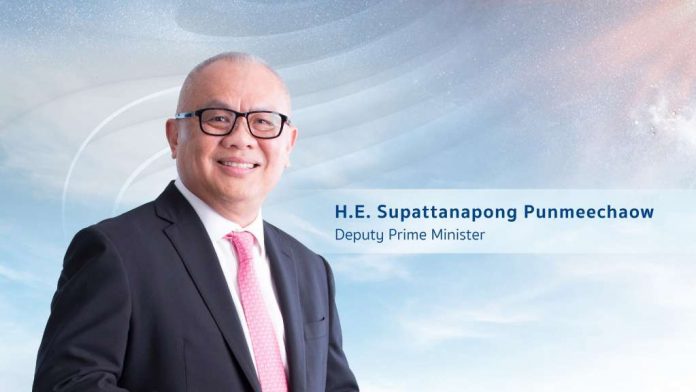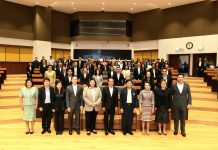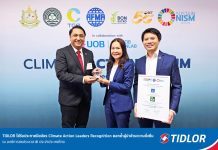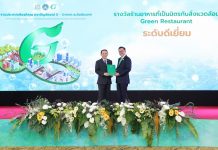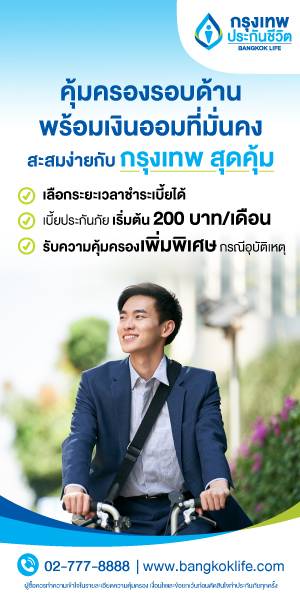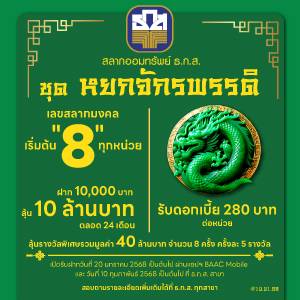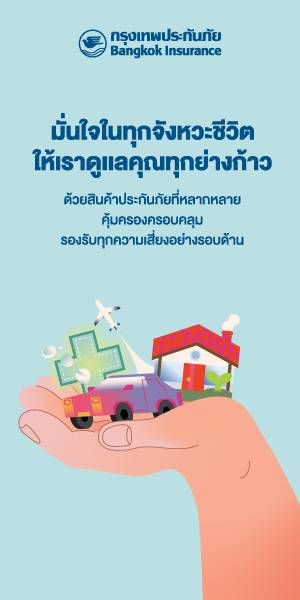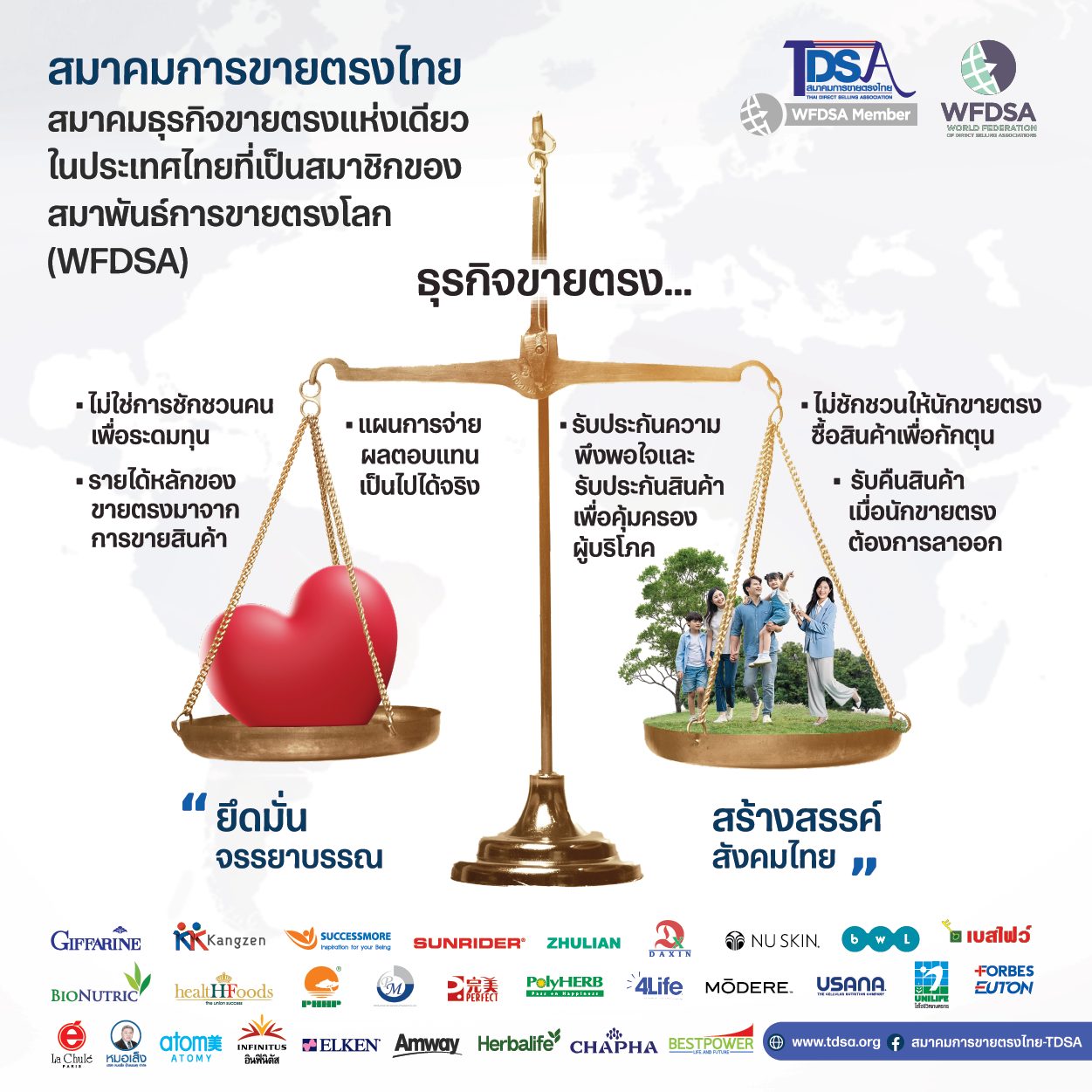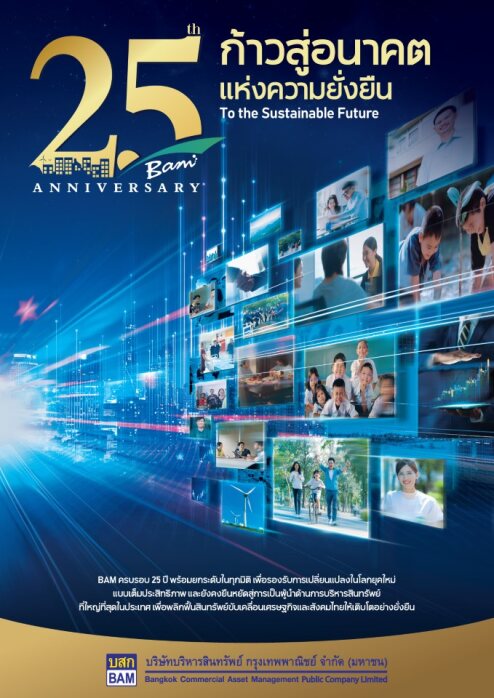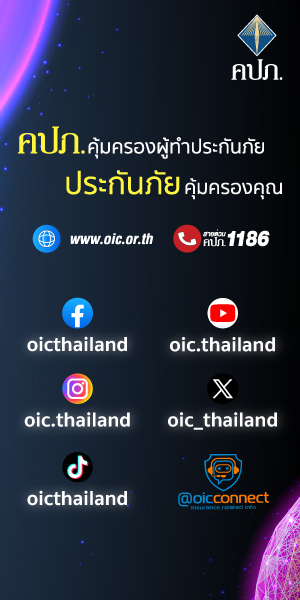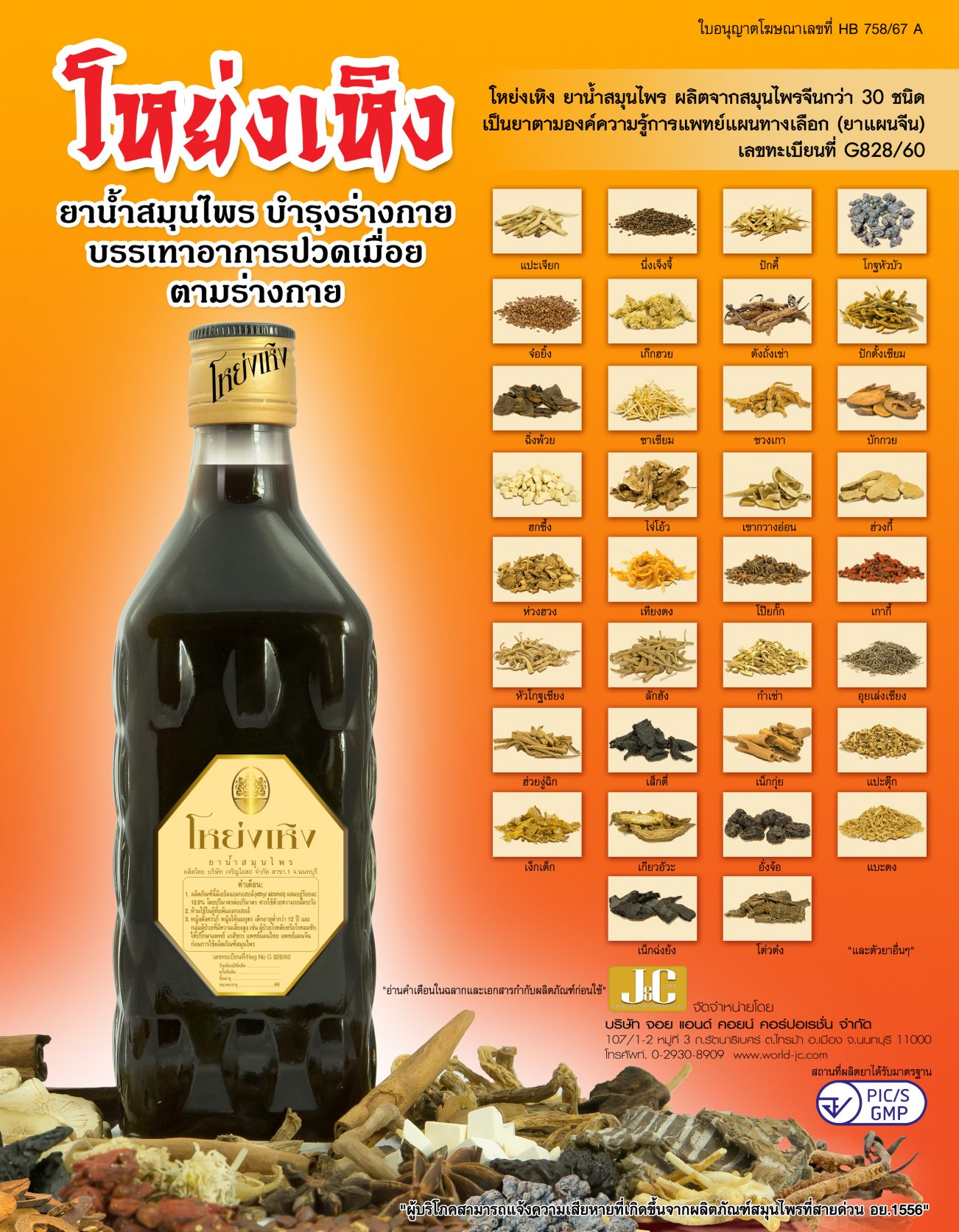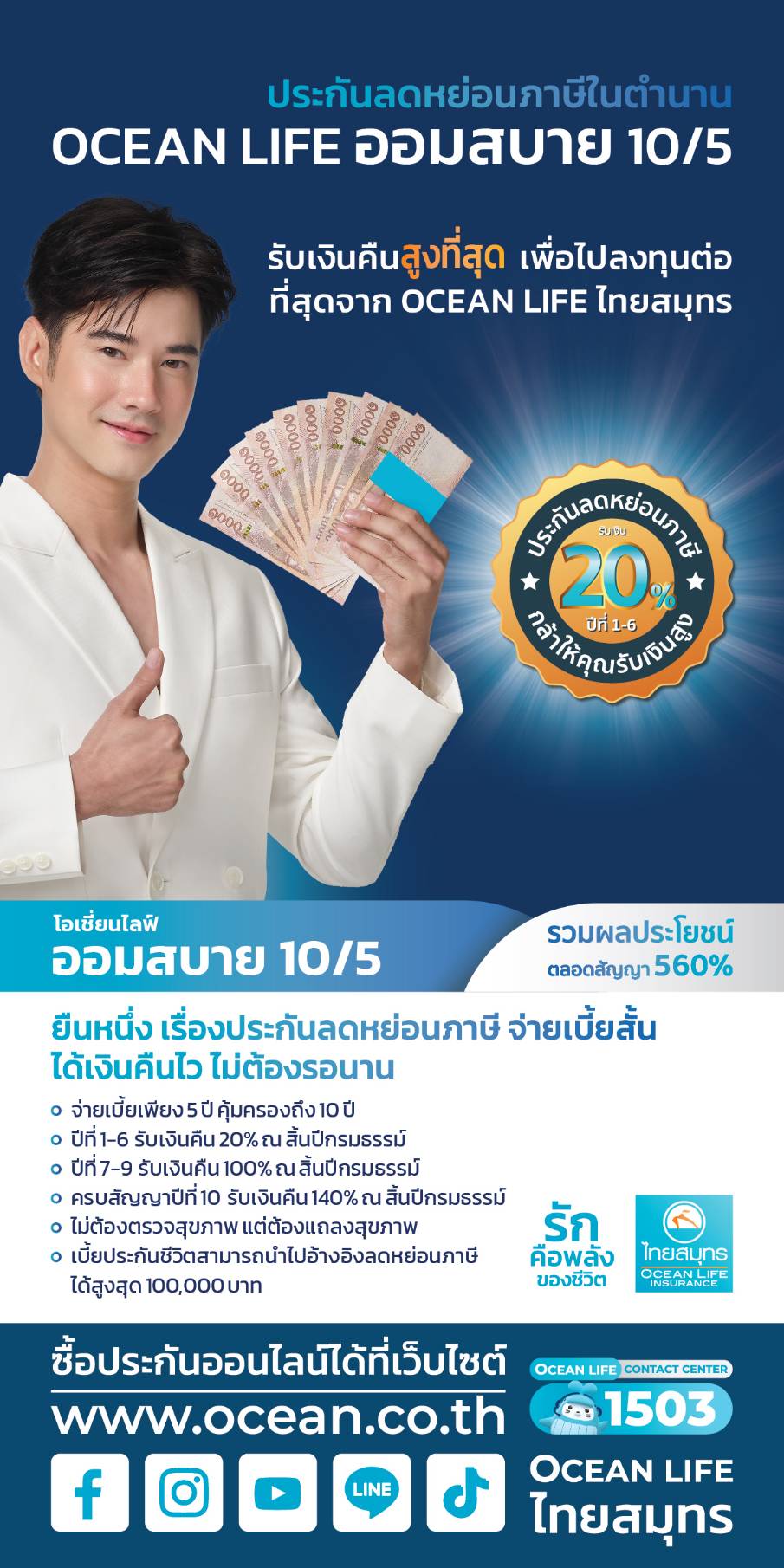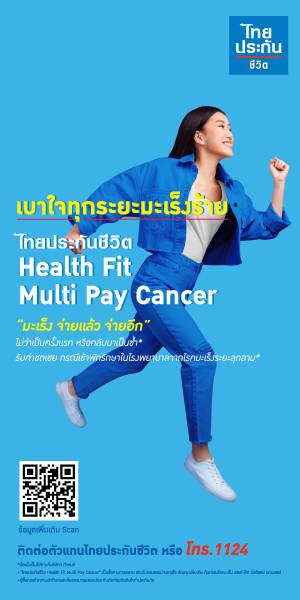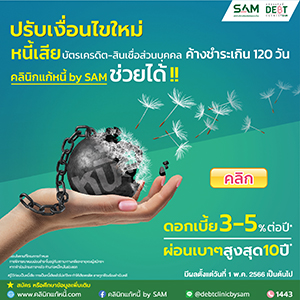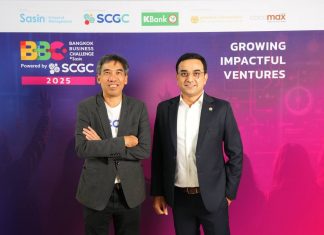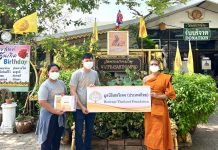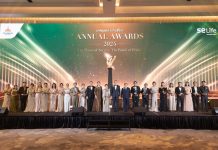สมาคมไทย-ญี่ปุ่น ร่วมมือกับธนาคารกสิกรไทย และสภาหอการค้าญี่ปุ่น-กรุงเทพฯ จัดงานสัมมนาในหัวข้อ “Thailand Post–COVID–19: Rain or Sunshine?” เพื่อสร้างความเชื่อมั่นให้กับนักธุรกิจไทยและญี่ปุ่นว่า ประเทศไทยพร้อมแล้วที่จะก้าวต่อไปหลังผ่านพ้นวิกฤติโควิด-19 และภาครัฐมีแนวนโยบายที่ชัดเจนในการพลิกฟื้นเศรษฐกิจ ตลอดจนการแก้ไขปัญหาเชิงโครงสร้างในระยะยาว รวมถึงตระหนักถึงโอกาสในการสร้างห่วงโซ่อุปทานที่สอดคล้องไปกับกระแส ESG อันจะเป็นปัจจัยขับเคลื่อนเศรษฐกิจไทยบนเส้นทางการเติบโตยั่งยืนในอนาคตข้างหน้า
นายสุพัฒนพงษ์ พันธ์มีเชาว์ รองนายกรัฐมนตรี กล่าวเปิดงานโดยสร้างความเชื่อมั่นให้กับนักลงทุนว่า “เศรษฐกิจไทยได้ผ่านจุดต่ำสุดในไตรมาสที่ 3 และกำลังเข้าสู่ช่วงฟื้นตัว ในช่วงหลังโควิด ภูมิทัศน์ของเศรษฐกิจไทยหลังโควิดจะเปลี่ยนไปและเต็มไปด้วยโอกาสทางธุรกิจ ดังนั้น เราต้องเสริมสร้างอุตสาหกรรมหลักของไทยให้แข็งแกร่ง เช่น ธุรกิจท่องเที่ยว ธุรกิจ health care อุตสาหกรรมอาหารแห่งอนาคต และอุตสาหกรรมยานยนต์ ตลอดจนปรับตัวให้สอดรับกับกระแส Climate Change”
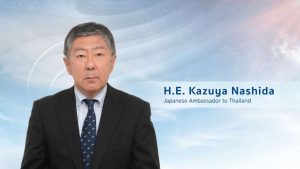
นายคาซูยะ นาชิดะ (Mr. Kazuya Nashida) เอกอัครราชทูตญี่ปุ่นประจำประเทศไทย มีความเห็นเกี่ยวกับความสัมพันธ์ไทยญี่ปุ่นในอนาคตว่าจะก้าวสู่ “การสร้างสรรค์ร่วมกัน (a partnership of co-creation)” โดยไทยและญี่ปุ่นจะสร้างสรรค์คุณค่าใหม่และนวัตกรรมร่วมกัน และความสัมพันธ์อันดีที่มีมายาวนานจะกลายเป็นความสัมพันธ์ที่เท่าเทียม เพื่อแบ่งปันภูมิปัญญาร่วมกัน และส่งเสริมซึ่งกันและกันในการสร้างสรรค์นวัตกรรมเพื่อสังคมที่ดีขึ้นในอนาคต
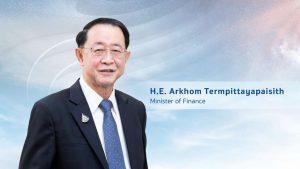
นายอาคม เติมพิทยาไพสิฐ รัฐมนตรีว่าการกระทรวงการคลัง กล่าวในงานเสวนาในหัวข้อ “ทิศทางของนโยบายภาครัฐ” ถึงแม้ว่ารัฐบาลต้องใช้งบประมาณมหาศาลเพื่อบรรเทาผลกระทบของโควิด ซึ่งปัจจุบันสถานะการคลังของไทยยังแข็งแกร่ง ภาครัฐมีสภาพคล่องมากพอที่จะดำเนินนโยบายเศรษฐกิจเพื่อฟื้นฟูเศรษฐกิจหลังจากนี้ ในส่วนของความกังวลประเด็นหนี้สาธารณะที่มีการขยายเพดานเพิ่มขึ้นจาก 60% เป็น 70% ของ GDP รัฐบาลมุ่งเน้นความสามารถในการชำระหนี้ โดยการดูแลให้รายได้ภาครัฐกับภาระดอกเบี้ยมีความสอดคล้องกัน นอกจากนี้ในส่วนของประเด็น climate change รัฐบาลมีแผนสนับสนุนการใช้รถยนต์ไฟฟ้าซึ่งจะเป็นส่วนช่วยแก้ปัญหาการปล่อยมลพิษรวมถึงฝุ่น PM2.5 ด้านนายดนุชา พิชยนันท์ เลขาธิการสภาพัฒนาการเศรษฐกิจและสังคมแห่งชาติ ได้กล่าวถึงแผนการปฏิรูปโครงสร้างประเทศที่คำนึงถึงประเด็นเชิงโครงสร้างทั้งการขาดแคลนแรงงาน การศึกษา สังคมผู้สูงอายุ ตลอดจนโครงสร้างพื้นฐาน ส่วนนางสาวดวงใจ อัศวจินตจิตร์ เลขาธิการคณะกรรมการส่งเสริมการลงทุน กล่าวถึงการมุ่งเน้นให้สิทธิประโยชน์การลงทุนเพื่อให้ห่วงโซ่การผลิตอุตสาหกรรมของไทยมีประสิทธิภาพมากขึ้นรวมถึงการยกระดับมูลค่าห่วงโซ่การผลิต ตลอดจนอำนวยความสะดวกให้ประเทศไทยสามารถดึงดูดแรงงานทักษะสูงจากต่างประเทศมากขึ้น
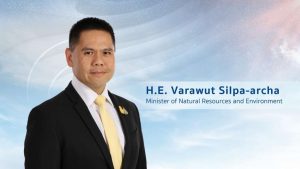
นายวราวุธ ศิลปอาชา รัฐมนตรีว่าการกระทรวงทรัพยากรธรรมชาติและสิ่งแวดล้อม ได้กล่าวปาฐกถาพิเศษในหัวข้อ “การมุ่งสู่ ESG ของไทย” โดยเน้นถึงความสำคัญของการมีส่วนร่วมในทุกภาคส่วนว่า “มีความจำเป็นอย่างยิ่งที่ภาครัฐ เอกชน และสังคมต้องร่วมมือกัน ผ่านทาง Public Private Partnership (PPP) ในการสร้างกลไกตลาดคาร์บอน และการสร้างความร่วมมือระหว่างประเทศในประเด็น Climate Change จากนี้ไป ยังมีโอกาสทางธุรกิจอีกมาก เช่น การมุ่งสู่อุตสาหกรรมคาร์บอนต่ำ แต่ต้องเร่งปรับตัวให้สอดรับกับกระแส Climate Change” นอกจากนี้ ในการพัฒนาที่ยั่งยืน ประเทศไทยจำเป็นต้องยกระดับอุตสาหกรรมสู่การสร้างห่วงโซ่อุปทานสีเขียว (Green Supply Chain) และการปลูกป่าทดแทน เพื่อบรรลุถึงเป้าหมายที่ net zero ที่ไทยได้ให้ไว้กับประชาคมโลก


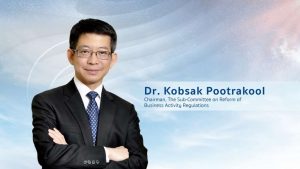
ในส่วนของเสวนาในหัวข้อ “การปฏิรูปกฎระเบียบภาครัฐเพื่ออำนวยความสะดวกทางธุรกิจ” การพัฒนาระบบราชการเพื่ออำนวยความสะดวกให้กับภาคธุรกิจเป็นปัจจัยสำคัญในการเพิ่มประสิทธิภาพและดึงดูดการลงทุนจากต่างประเทศ รัฐบาลไทยให้ความสำคัญกับ digital transformation โดยการปรับกระบวนงานและจัดเก็บข้อมูลในรูปแบบดิจิทัลเพื่อเชื่อมต่อและแบ่งปันข้อมูลระหว่างหน่วยงานภาครัฐ นางสาวอ้อนฟ้า เวชชาชีวะ เลขาธิการคณะกรรมการพัฒนาระบบราชการ กล่าวว่า “เราจะมุ่งไปสู่ digital government ซึ่งตอบโจทย์ภาคธุรกิจ นักลงทุนต่างชาติ และประชาชน” หลังจากนั้น ดร. กอบศักดิ์ ภูตระกูล ประธานคณะอนุกรรมการปรับปรุงกฎหมายที่เป็นอุปสรรคต่อการประกอบอาชีพและดำเนินธุรกิจ ยังกล่าวเสริมว่า “เพื่อที่จะดึงดูดการลงทุนจากต่างประเทศ รัฐบาลวางแผนจะผ่อนคลายกฎระเบียบภาครัฐเพื่อส่งเสริมการลงทุนในอุตสาหกรรมเป้าหมาย (S-Curve Industries) เช่น กฎระเบียบของสำนักงานตรวจคนเข้าเมืองในการขอวีซ่าและใบอนุญาตทำงานเพื่อดึงดูดแรงงานทักษะสูงจากต่างประเทศ โดยหลักการในการปฏิรูปกฎหมายมี 3 ประการด้วยกัน คือ ความถูกต้อง ความจำเป็น และการอำนวยความสะดวกทางธุรกิจ
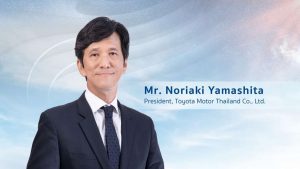

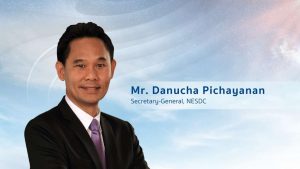
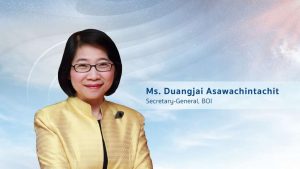
งานสัมมนาวันนี้ยังได้รับเกียรติจากนักธุรกิจชั้นนำ และข้าราชการระดับสูงเข้าร่วมงาน ได้แก่ นายโนริอากิ ยามาชิตะ (Mr. Noriaki Yamashita) กรรมการผู้จัดการใหญ่ บริษัท โตโยต้า มอเตอร์ ประเทศไทย จำกัด นายวิกรม กรมดิษฐ์ ประธานกรรมการบริหาร บริษัท อมตะ คอร์ปอเรชัน และนายอัทสึชิ ทาเคทานิ (Mr. Atsushi Taketani) ประธานเจโทร สำนักงานกรุงเทพ เสวนาในประเด็นความท้าทายของไทยในการก้าวข้ามปัญหาเชิงโครงสร้าง และเสริมสร้างสิ่งแวดล้อมในการดำเนินธุรกิจเพื่อพัฒนาความสามารถในการแข่งขันของไทย

ในช่วงสุดท้าย นายกลินท์ สารสิน นายกสมาคมไทย–ญี่ปุ่น และประธานอาวุโส สภาหอการค้าไทยแห่งประเทศไทย ได้กล่าวสรุปว่า “เศรษฐกิจไทยกำลังฟื้นตัวจากโควิด ท่ามกลางประเด็นท้าทายหลายหลายที่เศรษฐกิจไทยกำลังเผชิญ ภาครัฐและเอกชนมีความร่วมมือที่จะสร้างสภาวะแวดล้อมทางธุรกิจให้เอื้อต่อการลงทุนที่ตอบโจทย์การเปลี่ยนแปลงหลังจากโควิด ทั้งนี้ ประเด็นต่างๆ ที่ได้ถูกหยิบยกมากล่าวในงานสัมมนานี้คาดว่าจะเป็นประโยชน์และช่วยเสริมสร้างความร่วมมือระหว่างภาครัฐและเอกชน เพื่อก้าวไปสู่การพัฒนาที่ยั่งยืนในอนาคต”
Thai–Japanese Association holds seminar for business communities
to visualize Thailand’s post-pandemic growth prospects
BANGKOK, 26 November 2021 – The Thai–Japanese Association, in collaboration with KASIKORNBANK and the Japanese Chamber of Commerce, Bangkok, held a seminar on “Thailand Post–COVID–19: Rain or Sunshine?” for the Japanese and Thai business communities to affirm that Thailand is ready to move forward in the post pandemic period. Most importantly, the Thai government has a clear policy direction to revive the domestic economy, overcome long–term structural issues and build new supply chains in line with ESG momentum to create a sustainable future.
The seminar began with an opening remark by H.E. Supattanapong Punmeechaow, Thailand’s Deputy Prime Minister. He reaffirmed investors’ confidence that “the Thai economy has already passed its bottom in the third quarter of this year and entered the stage of sunrise” and that “the new economic landscape for Thailand after COVID–19 is full of opportunities. To grasp them, it requires not only strengthening our existing flagship industries, such as tourism, health care, food for the future, automotive industry, but also paying attention to the climate change issue.” Subsequently, H.E. Kazuya Nashida, Japanese Ambassador to Thailand, envisaged the future of Japanese–Thai cooperation as “a partnership of co–creation” and mentioned that “Japan and Thailand can jointly create new value and innovation. I believe that the relationship between Japan and Thailand, which has long been developed, can be an equal one where we share wisdom together and complement each other to create innovation with the aim of making a better society.”
The seminar was followed by a panel discussion to visualize the policy landscape. Although large fiscal resources were employed to mitigate the COVID–19 impact, H.E. Arkhom Termpittayapaisith, Minister of Finance, assured that “at present, Thailand’s fiscal status is still strong. The government’s fiscal position has sufficient liquidity for the government’s policy implementation.” Regarding the concerns over the public debt level which its ceiling was lifted from 60% to 70%, “the public debt level is not a key point of focus. The government would rather focus more on debt affordability by closely monitoring the interest burden as compared to collected revenue.” H.E. Arkhom emphasized that to address climate change issues, the government aims to promote usage of electric vehicles to tackle CO2 and PM 2.5 and eventually to promote Thailand as an automotive hub. Later, Mr. Danucha Pichayanan, Secretary General of NESDC explained that the government is well aware of key structural issues including aging society, labor shortage, education and infrastructure and plans for Thailand’s transformation based on 4 key development dimensions – targeted manufacturing and service sectors, socio–economic opportunity and equity, sustainability and key enablers, especially high–performance workforce and streamlining government process. Meanwhile, Ms. Duangjai Asawachintachit, Secretary General of BOI explained that BOI is shifting its policy focus towards a sector–based approach and providing greater investment incentives to promote higher value–added supply chains, higher technological content, and industrial transformation. BOI also provides incentives to attract international talents to work in Thailand to mitigate skilled–labor shortage issues.
Afterwards, H.E. Varawut Silpa–archa, Minister of Natural Resources and Environment, provided a keynote address on Thailand’s shifting towards ESG. He emphasized the need for participation from all levels that “it is imperative for governments, businesses and civil society to work together through public–private partnerships in climate action networks, carbon market mechanisms as well as regional and international cooperation. Plenty of business opportunities including industrial de–carbonization are open to us, but we have to act now”.
The seminar was followed by a panel discussion on the improvement of Thailand’s business environment through regulatory and public sector reform. Business facilitation is vital for the country, in which the public sector plays an important role in providing a sound and good ecosystem for businesses. The Thai government prioritizes digital transformation by reviewing working processes and digitizing data so that information can be connected and shared among government agencies. Ms. Onfah Vejjajiva, Secretary General, Office of the Public Sector Development Commission mentioned that “we are moving towards digital transformation to become an efficient and effective digital government that responds to the people, foreign investors, and businesses.” Meanwhile, Dr. Kobsak Pootrakool, Chairman of the subcommittee on business activity regulation reform emphasized that “to attract FDI into Thailand, the most important thing is to reduce unnecessary rules and regulations.” The government plans to relax regulations to enable investment in S–curve industries, including immigration rules to attract global talents.
Subsequently, the seminar today was also attended by other high–profile businessmen, Mr. Vikrom Kromadit, Chairman of the Board of Directors of Amata Corporation and Mr. Noriaki Yamashita, President of Toyota Motor Thailand, as well as Mr. Atsushi Taketani, Chairman of JETRO Bangkok, to reflect some of key investment challenges for Thailand in moving towards a better operational business environment and becoming competitive among global and regional investment destinations.
Last but not least, Mr. Kalin Sarasin, the President of Thai–Japanese Association and Senior Chairman of the Thai Chamber of Commerce and Board of Trade of Thailand concluded that “Thailand’s overall business environment is undoubtedly at sunrise. The growth path is lying ahead but the task ahead of us will not be easy. To that end, we’ve convened this critical seminar because we know that confronting today’s economic issues as a result of COVID–19 will demand our concerted and collaborative efforts. Let us work together to ensure that our multi–stakeholder collaborations succeed to help Thailand build back better and towards sustainable and resilient society.”



